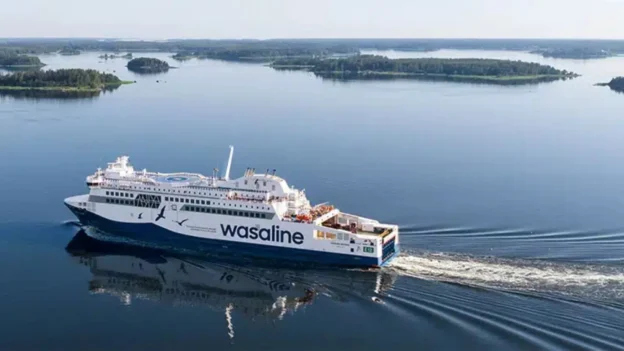The shipping company Wasaline has succeeded in positioning itself as the first shipping company to achieve carbon neutrality in the Baltic Sea. Thanks to a renewable biogas supply contract with Gasum and a FuelEU Maritime pooling agreement with Stena Line, the route between Vaasa (Finland) and Umeå (Sweden) becomes the first international green shipping corridor international green shipping corridor.
The company operates with the hybrid ferry Aurora Bothniaequipped with dual-fuel engines, batteriesbatteries and energy storage systems. An expansion of its energy capacity to 12.6 MWh is currently underway, which will make this vessel the one with the highest electric autonomy within the RoPax segment.
Wasaline’s strategy for carbon neutrality
In an industry focused on regulatory exemptions and ETS costs, Wasaline chose to capitalize on opportunities. “While others are looking for exemptions, we are advancing sustainability,” said Peter Ståhlberg, the shipping company’s CEO. Thanks to the exclusive use of renewable fuelsthe company has anticipated its 2030 climate target and is already operating in a carbon-neutral manner.
The certified biogas, supplied by Gasum, allows Wasaline to maintain daily operations with no net emissions. This strategic partnership allows Stena Line to access additional sustainable fuel, balancing its regulatory pool and optimizing costs in the face of tightening European regulations.
A partnership for the decarbonization of the sea
The Vaasa-Umeå route has been recognized by DNV as the first green corridor in operation within the Nordic Roadmap. This development supports the objectives of the Clydebank Declaration and other Nordic initiatives towards the decarbonization of shipping..
For its part, Gasum reaffirms its commitment to expanding access to biogas in the maritime area. “Biogas is a concrete and available solution to reduce emissions today,” said Jacob Granqvist, vice president of the maritime area.
This initiative completely transforms the way of operating on one of the world’s northernmost shipping lanes. Cargo, passenger and logistics operations are now integrated into a truly sustainable value chain.
Source and photo: Wasaline

